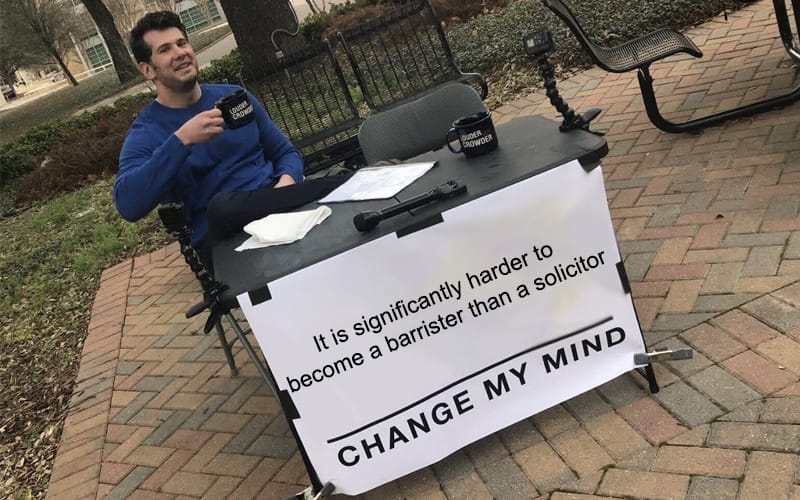Sparks LinkedIn debate

A barrister has sparked a debate online after claiming it’s “significantly harder” to become a barrister than a solicitor.
Natalie Connor, who describes herself as a “recovering barrister” on LinkedIn, made the eye-catching claim in a post concerning the rules relating to qualifying work experience (QWE) and explained why, as a barrister, she is unable to sign off on trainees’ work.
Introduced alongside the Solicitors Qualifying Exam (SQE), the changes to on-the-job experience allow aspiring solicitors to bypass the traditional training contract process. They can now complete two years of QWE with up to four different employers, including law firms, in-house legal teams and law clinics.
The Solicitors Regulation Authority (SRA) says that this work must be signed off by a solicitor or registered compliance officer.
This rule appears to be a source of frustration for Connor, who explains that she has been working as a general counsel in-house for tech companies for the past five years.
And while some agreed that the rule seems like a classic example of unnecessary red tape, it wasn’t the only talking point under Connor’s post.
This is because the barrister, who was previously a member of 7 King’s Bench and 11KBW before moving in-house, went on to say the following:
“It is significantly harder to become a barrister than a solicitor. It’s more competitive to train and qualify, and you’re then self-employed from day dot in a ‘learning by doing’ approach at the coalface of real-life legal disputes (hello courtrooms after 6 months, not photocopying client files…).”
Enter the solicitors.
“I have to disagree with this Natalie, and actually, it’s quite disappointing to see people still pushing this narrative to draw even bigger divides between solicitors and barristers in the legal industry,” wrote Pheobe Greenwood, senior legal counsel at tech company Xaar. “What’s significantly harder for one is not always the same for others — it’s all subjective and it depends entirely on your social mobility, your bank balance and your network as to which route is a) open to you and b) will be ‘harder’”.
Elsewhere, Keystone Law partner Andrea James commented: “maybe the fact that you’ve published a statement like ‘It is significantly harder to become a barrister than a solicitor,’ despite never having trained or qualified as a solicitor or worked in a solicitors’ practice, indicates that the SRA is right on this matter!”
Responding below the line herself, Connor appeared to double-down on her position, stating that it’s categorically harder being a pupil barrister in the first 6 months (and indeed the first 12 months which is the full duration of pupillage — we don’t get 2 years like trainee solicitors). And I stand by that.”
Even a fellow barrister struggled to agree with Connor’s viewpoint. “Having practised as both and for many years was a training principle, I can’t agree with you that training to be a solicitor is ‘easier’,” wrote Simon Heaney, a tenant at St John’s Buildings Barristers’ Chambers. “I can’t see how a rigorous TC (as was) was/is a very tense and difficult experience not to do and to observe.”
In a further post this morning, the barrister sought to clarify her position, stating, ‘Many misunderstood my post and thought I was suggesting that it is harder to be a barrister than a solicitor. I don’t think that.”
“In many ways I think it’s actually harder to BE a solicitor — although realistically I think the jobs are so different it’s impossible to make an objective comparison,” Connor continued. “What I think we CAN objectively compare, however, is the relative difficulty of BECOMING a barrister versus BECOMING a solicitor.”
Connor then goes on to detail some of the difficulties of life as would-be barrister, including lack of financial assistance, challenges securing pupillage and “no structured training”.
Setting aside the question of who has it tougher, many students will likely share Connor’s frustrations around QWE. Legal Cheek reported on research earlier this month that found 17% of students described the sign-off process as “difficult” or “very difficult,” marking a four percentage point increase from the previous year.


